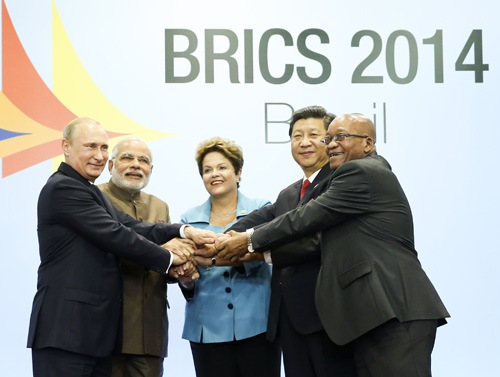|
 |
|
LET'S UNITE: BRICS leaders--Russian President Vladimir Putin, Indian Prime Minister Narendra Modi, Brazilian President Dilma Rousseff, Chinese President Xi Jinping and South African President Jacob Zuma (left to right)--attend the the emerging-economy bloc's sixth summit in Fortaleza, Brazil, on July 15 (LAN HONGGUANG) |
Brazil continues capturing the world's attention even as the 2014 FIFA World Cupsoccer tournamenthas come to an end in the country. The Sixth Summit of BRICS countries--Brazil, Russia, India, China and South Africa--was held in the northeastern city of Fortaleza on July 15 under the theme of "Inclusive Growth: Sustainable Solutions."
The meeting was attended byBrazilian President Dilma Rousseff, Russian President Vladimir Putin, Indian Prime Minister Narendra Modi, Chinese President Xi Jinping and South African President Jacob Zuma. Theydiscussedsolutions to development challenges and to showcase their cooperative accomplishments.
The Fortaleza Summit initiates the second round of the annual BRICS summit, which the five countries take turns hosting. The first BRIC summit--South Africa was not included in the bloc until 2010--was held in the Russian city Yekaterinburg in 2009, initiating the cooperation mechanism of the emerging economies.
In the past five years, BRICS has forged an impressive partnership and extended common interests in the midst of a complex international context. At present, the emerging-economybloc has been implementing cooperation initiatives in more than 30 fields.
Undoubtedly, the establishment of the New Development Bank (NDB) and the Contingent Reserve Arrangement (CRA)tops the agenda of this year's summit. It is a long-awaited achievement signaling a big step forward in the group's role in global financial governance.
According to the Fortaleza Declaration, the NDB, to be headquartered in China's Shanghai, aims to finance infrastructure and sustainable development projects in BRICS and other emerging and developing economies.It shall have an initial authorized capital of $100 billion. The initial subscribed capital will total $50 billion, equally shared among founding members. The NDB will also set up an African regional center in South Africa, which will be established concurrently with the headquarters.
And the CRA--with an initial size of $100 billion--will help countries forestall short-term liquidity pressures, promote further BRICS cooperation, strengthen the global financial safety net and complement existing international arrangements. Both the NDB and CRA are open to other developing countries. Each member provides different capital in the CRA corresponding to their financial situation. China offers the largest capital sum of $41 billion to the reserve and receives a credit of $20.5 billion. South Africa provides $5 billion and has a doubled credit of $10 billion.
An alternative way?
Since BRICS made its announcement, the new finance institution has been subject to widespread global attention. Western media outlets have asked whether it will act as an alternative to the current Bretton Woods institutions, including the International Monetary Fund (IMF)and World Bank.
"The new bank is established for the purpose of promoting development of BRICS countries, especially in terms of infrastructure development in these countries. It is to meet the demand of BRICS and is also a beneficial supplement of current international institutions rather than a competitor," Huang Wei, a researcher with the Institute of World Economics and Politics under the Chinese Academy of Social Sciences, told Xinhua News Agency.
| 